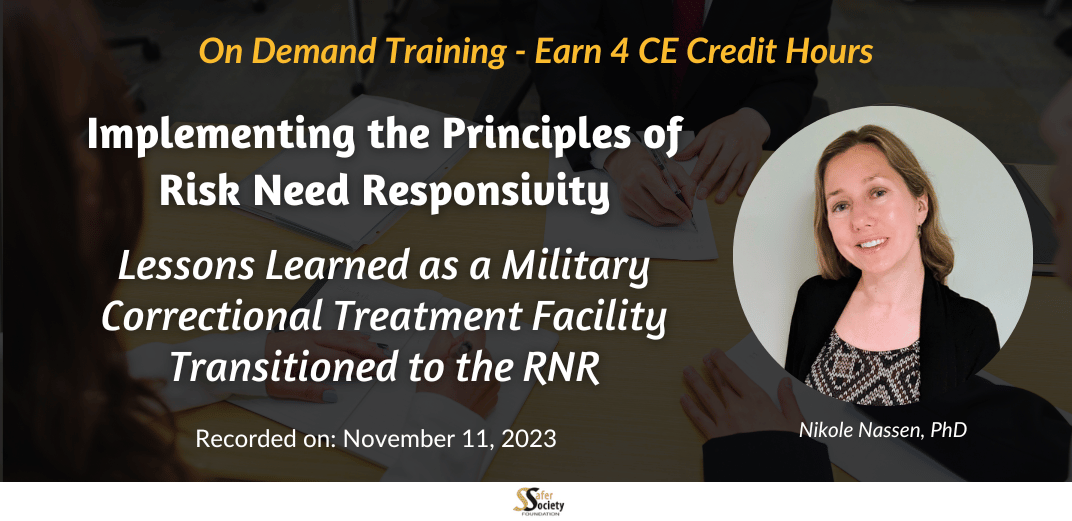
Implementing the Principles of Risk Need Responsivity: Lessons Learned as a Military Correctional Treatment Facility Transitioned to the RNR
Already purchased an On Demand training?
Click here to access your Safer Society On-Demand Training Center account.
The principles of effective correctional rehabilitation, also known as risk, need, and responsivity (RNR) have become recognized as an essential foundation for the treatment of individuals who have committed sexual offenses. While research has demonstrated the importance of these principles, many agencies face challenges in moving existing programs to this model. Examples of these challenges include:
a) shifting resources to develop and implement a new program,
b) creating a program that is more individualized and tailored to each client’s needs and learning style,
c) transitioning current clients to a new, potentially more complex model, and
d) determining what changes need to be made to increase responsivity within the treatment setting, agency, and larger systems in which a client interacts.
In 2015, the Naval Consolidated Brig Miramar (NCBM) received an extensive program evaluation and made the transition from a long-standing relapse prevention approach to an RNR model. Unique aspects of working within a military system and tailoring a curriculum to meet the needs of service members were integral considerations to the success of the new program.
During this presentation, the Brig’s treatment director, Dr. Nassen, discusses a step-by-step process for changing program models, using examples from NCBM’s experience that can be generalized for others considering program changes. Lessons learned along the way and suggestions for practical application of the RNR principles will be provided.
Key topics discussed include:
- The principles of risk, need, and responsivity.
- The evaluation of programs treating individuals who have sexually abused.
- The processes involved in program development.
- Implementation of RNR.
- Program maintenance.
1) Explain the process of program evaluation and development.
2) Apply RNR principles to their treatment programs.
3) Critique approaches to improving existing programs with newer models.
Audience
This training is for professionals working with people who have perpetrated abuse. Professionals who will benefit from this training include social workers, psychologists, clinical counselors, and interested paraprofessionals.
Content Level
Disclosure
Continuing Education Approval
American Psychological Association (APA)
Safer Society Foundation, Inc. is approved by the American Psychological Association (APA) to sponsor continuing education for psychologists. Safer Society Foundation, Inc. maintains responsibility for this program and its content.
Who's Presenting

Nikole Nassen, PhD
Nikole Nassen, Ph.D., is a clinical psychologist and the director of the Sex Offender Treatment Program at Naval Consolidated Brig Miramar. She has been involved in program development and implementation for Naval Corrections’ Violent Offender and Sex Offender Treatment Programs and has worked with individuals who have expressed non-traditional sexual interests in the context of these programs. Dr. Nassen is a Clinical Member of the Association for Treatment and Prevention of Sexual Abuse (ATSA) and is a member of ATSA’s Adult Clinical Practice Committee. She is also the Training Coordinator for the California Association for Treatment and Prevention of Sexual Abuse (CalATSA). Dr. Nassen received her doctorate degree in Clinical Psychology from Alliant International University in 2008. She has assessed and treated individuals who have committed violent and sexual offenses, as well as individuals with mental health concerns, in community and in correctional settings. She has also completed clinical and forensic evaluations of adults and adolescents for the Delinquency and Dependency Courts in San Diego.
